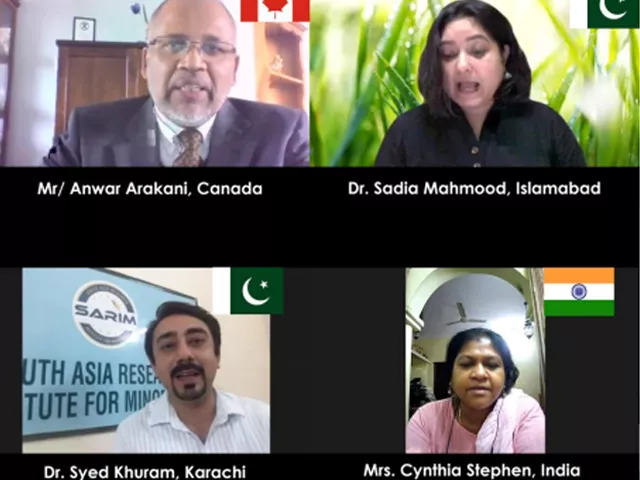International video conference held to discuss minorities' woes amid virus crisis
Speakers from Canada, India, Maldives and Pakistan attend conference
ISLAMABAD: The South Asia Research Institute for Minorities (SARIM) organised an international video conference to discuss the difficulties being faced by minorities in the region amid the crisis triggered by Covid-19 pandemic.According to a statement issued on Tuesday, the conference titled 'Covid-19: The Vulnerabilities of Minorities in South Asian Perspective' was attended by speakers from Canada, India, Maldives and Pakistan on Monday.
Anwar Arakani, President Rohingya Association of Canada said, “In India, under the BJP government, the RSS and Hindutva have been unleashing their wrath on defenseless Rohingya refugees for years. Young Rohingya refugee girls are often kidnapped in broad day light with full impunity."
During the Covid-19 pandemic, local and central governments blame Muslims for spreading the virus and the Rohingyas are the "weakest link".
During the Covid-19 pandemic where many boats loads of fleeing Rohingya refugees were dying in the Bay of Bengal and remain afloat for weeks, Bangladesh has come to rescue in fulfilling the calls made by many countries around the globe.
However, those rescued Rohingya were sent to the Bhachan Char island, under the pretext of “isolating and quarantining” them of Covid-19 infection.
Mukesh Kumar, President Pakistan Young Hindu Forum said during the Covid-19 crisis, the minority communities including Hindus have followed the regulations and all social distancing measures are also being taken by the community.
The government through its Ehsaas program has given Rs12,000 to each poor family including the minorities without any discrimination, said Mukesh, adding that all medical facilities are also being provided without any discrimination.
"Our community also boasts a high number of doctors
contributing positively in this medical crisis. The community has top
businessmen who are all contributing positively in this crisis through donations all over the country”.
Cynthia Stephen, President Training, Editorial and Development Services Trust, Banglore, India said, the situation in India is causing some concern as many lives have already been lost.
"In the present context of the corona pandemic, it's true that the people most affected would be the Muslim minorities and another large section of the Indian population - the migrant workers. They are walking back home, thousands of kilometres away, under the most adverse conditions."
Speaker from Maldives, Dr Mariyam Shahuneeza, founder President of Countering Violent Extremism Through Youth Empowerment said data shows minorities and other marginalised communities hit harder by Covid-19 "possibly due to living conditions and healthcare facilities disparity"
According to the South Asia State of Minorities Report 2019, due to discriminatory laws in some South Asian countries, vulnerable communities are denied official refugee or minority status and in many parts of South Asia hate speech and targeted violence against minorities were observed.
According to the UN Special Rapporteur on Minority Issues, this deprives minorities and other marginalised communities of essential rights and services including access to healthcare and information in their own language.
Dr Sadia Mahmood, Assistant professor, Quaid-e-Azam University (QAU), Islamabad said, the ongoing pandemic has affected religious minorities in different South Asian countries variably.
It specifically hasn’t changed anything for Muslim communities in certain South Asian countries where they were already being subjected to majoritarian exclusionary politics, communal violence, oppressive state policies, and discrimination, she added.
Dr Sadia said in Pakistan, although the pandemic didn’t help already existing fissures in the society to disappear, it also did not exacerbate these faultlines to victimise the religious minorities.
"Neither is there any discriminatory policy adopted by the state. The
religious minorities in Pakistan have so far not reported any incidents of discrimination in the context of Covid 19," she maintained.
After the Pakistani government issued the policies of physical distancing to be observed at the places of worship, these policies were voluntarily adopted by the religious minorities, said the professor, adding that structural vulnerabilities of everyday life are and will impact marginalised communities regardless of their religion.


COMMENTS
Comments are moderated and generally will be posted if they are on-topic and not abusive.
For more information, please see our Comments FAQ